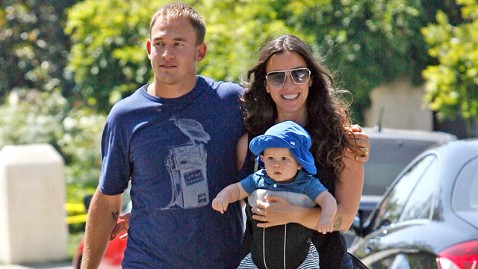Alanis Morissette Will Breastfeed Son Until He Is 'Finished'

Alanis Morissette is head over feet for breastfeeding, and said she plans on feeding her son the natural way until he "is finished and weaned."
"I think it affords the child, when he grows up, to have a lot less therapy to go to," the "Jagged Little Pill" singer, who has a 16-month-old son, Ever, said last week on "The Billy Bush Show."
"For me, I protect his safety and his well-being and his attachment," said Morissette, 37, who is married to rapper Mario "Souleye" Treadway. "That stage of development is a very important stage."
Morissette's comments come on the heels of the debate raised by a recent issue of Time magazine, which featured a cover photo of Los Angeles mother Jamie Lynne Grumet standing up and breastfeeding her 3-year-old son. The photo sparked a debate regarding attachment parenting, a term coined by pediatrician Dr. William Sears for the parenting style that includes co-sleeping with the child, "baby wearing" (carrying the baby close to the body in a sling) and extended breastfeeding.
But while attachment parenting may be a style, breastfeeding one's baby is the natural way of feeding infants and young children, said Susan Burger, president of the New York Lactation Consultant Association.
"Some parenting styles may facilitate and other parenting styles may interfere with healthy breastfeeding," Burger said. "While attachment parenting tends to facilitate breastfeeding and breastfeeding tends to facilitate attachment parenting, a variety of different types of parenting styles can lead to successful breastfeeding."
The American Academy of Pediatrics recommends nursing until the baby is 1 year old, and continuing if the mother and baby are comfortable.
"It is a relationship just like any other relationship where the needs of both individuals should be balanced," Burger said. "Peer-reviewed research shows that children who are breastfed as long or longer than the two years recommended by the World Health Organization are at least as independent and socially well adjusted than children who are breastfed for a shorter duration if not more so."
The average age of weaning around the world is about 4 years old, said Emma Kwasnica, a Vancouver, B.C.-based childbirth and breastfeeding educator. In the United States, Kwasnica said, it is nearly impossible for working moms with no maternity leave to continue breastfeeding to meet even the AAP's guideline, which fails the most vulnerable members of society, "our babies."
"The role of breastfeeding in attachment parenting is about so much more than simple caloric input; attachment parenting encourages bonding and skin-to-skin contact, of which breastfeeding provides both," Kwasnica said. "I think that we in Western society lose sight of what breastfeeding an older child is all about: it's a simple cuddle time with mom, a time of warmth and love and nurturing, where a busy toddler can reconnect with mom.
"We are mammals," she continued. "If we lose our sense of human connection, human touch, what does the future of humanity look like? Pretty bleak, if you ask me."